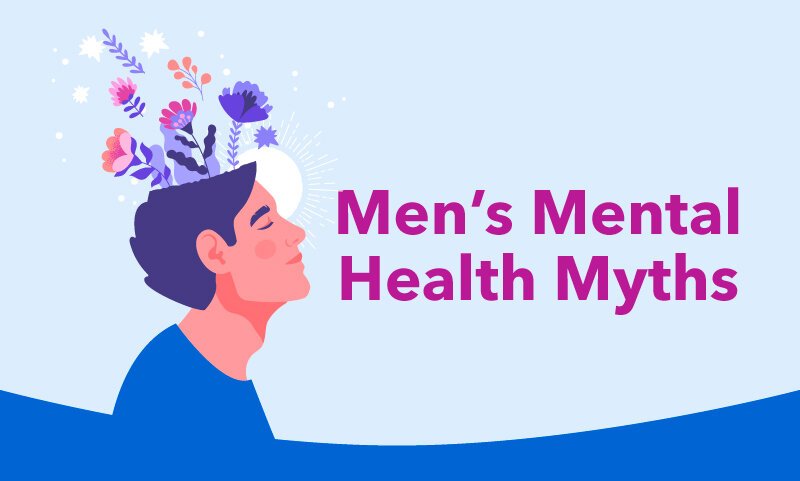
The Truth About Men's Mental Health: Separating Fact from Fiction
This blog post will explore some of the most common myths and misconceptions surrounding men's mental health. Despite growing awareness and acceptance of mental health issues in recent years, men continue to face stigma and stereotypes that can prevent them from seeking help or receiving the support they need. By examining and debunking these myths, we hope to promote greater understanding and empathy for men's mental health struggles and encourage more open and honest conversations about these issues. The post will provide information and resources for readers who may be struggling with their own mental health or know someone who is.

Beyond "Manning Up": Practical Tips for Supporting Men's Mental Health
This blog post provides tips on how to support a friend or family member who is struggling with men's mental health issues. It emphasizes the importance of listening without judgment, encouraging professional help, offering practical assistance, educating yourself, and taking care of yourself. By following these tips, you can provide valuable support to your loved one and let them know that they're not alone in their struggles.

Building a Culture of Mental Wellness: Supporting Men in the Workplace
This blog post discusses the importance of creating a supportive environment for men's mental health in the workplace. It highlights the various factors that can impact men's mental health, such as stress, work-life balance, and stigma around seeking help. The post provides five tips for employers to create a supportive environment, including education and awareness, promoting work-life balance, addressing stigma, providing training for managers and leaders, and fostering a positive and supportive culture. By implementing these strategies, employers can create a culture that prioritizes mental health and well-being and supports the mental health of all employees, regardless of gender.

Tough Enough? How Toxic Masculinity Contributes to Men's Mental Health Struggles
In this blog post, we'll explore how toxic masculinity affects men's mental health. We'll discuss how traditional beliefs and expectations around masculinity can lead men to suppress their emotions, which can make it difficult to seek help when they need it. We'll also cover how toxic masculinity can lead to stress, anxiety, and even risky behavior, and discuss the importance of promoting healthier and more balanced ideas of masculinity to support the mental health and well-being of men.

Anxious Minds: Why Men Need to Start Talking About Anxiety
This blog post explores the signs and symptoms of anxiety in men, including physical symptoms, irritability and anger, avoidance behavior, substance use, and sleep disturbances. It also offers several tips for men on how to get help if they are struggling with anxiety, such as seeking professional help, talking to a trusted friend or family member, practicing self-care, considering medication, and joining a support group. Overall, the post aims to raise awareness about the importance of recognizing and addressing anxiety symptoms in men and encourages men to seek help when needed.

The Silent Struggle: Men and Suicide Risk Factors
This blog post discusses the higher risk of suicide among men and explores some of the risk factors that contribute to this disparity, such as mental health conditions, history of trauma, social isolation, access to lethal means, and financial stress. The post also offers several tips on how men can get help if they are struggling with suicidal thoughts, including seeking professional help, reaching out to a loved one, calling a crisis helpline, removing access to lethal means, and practicing self-care. Overall, the post aims to raise awareness about the importance of suicide prevention and encourage men to seek help when needed.

Breaking the Stress Cycle: 7 Tips for Men to Cope with Stress
Stress can be particularly challenging for men who may feel pressure to be strong and self-sufficient. In this blog post, we explore seven effective tips for coping with stress that are specifically geared toward men. These tips include connecting with others, practicing relaxation techniques, exercising regularly, practicing mindfulness, getting enough sleep, setting realistic expectations, and taking breaks. By implementing these strategies, men can develop effective coping mechanisms for managing stress and promoting good mental health.

Breaking the Stigma: Why Male Role Models are Key to Mental Health Advocacy
Male role models can play a powerful role in reducing the stigma surrounding mental health issues and promoting access to care. By speaking openly about their own mental health struggles, promoting accurate information about mental health, and providing support to those who are struggling, male role models can help to create a culture of mental health awareness and support. By working together to support male role models and promote mental health advocacy, we can create a healthier and more supportive society for all.

Breaking the Silence: Why Stigma Still Haunts Men's Mental Health
Despite progress in reducing the stigma surrounding mental health, men still face significant barriers when it comes to seeking help for mental health issues. The persistent cultural expectation that men should be strong and self-reliant, along with myths and misconceptions about mental health, can make it difficult for men to talk openly about their struggles and seek the support they need. However, by promoting education and awareness, encouraging open conversations, and providing support to men who are struggling, we can work to break down these barriers and reduce the stigma surrounding men's mental health.

Can we fix it?!
Men are often socialized to believe that their value lies in their ability to solve problems, which can lead to a tendency to approach all situations, including relationships, as problems to be solved. This can be frustrating for partners who just want to be heard and validated. However, by practicing active listening and becoming more comfortable with emotions, men can build stronger and more fulfilling relationships.
